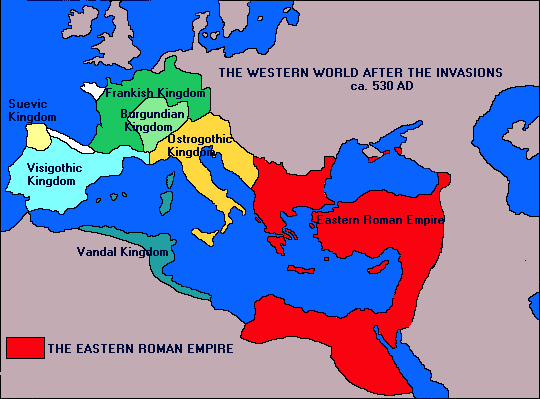|
The Western Roman Empire
What the well educated latin-speaking Romans knew of
the Greek natural philosophy works came from popularizers and compilers
such as Pliny the Elder (1st Cent. CE) who wrote a Natural History
and Capella (early Vth Cent. CE). For those with a deeper interest in astronomy,
natural philosophy works (such as those of Aristotle and Ptolemy) were
available in Greek. Most of the elite-class Romans that were interested
in that subject were also fluent in Greek and were able to read the works
in that language.
Decline of knowledge in the West
Beginning in the third century CE, the Roman Empire fragments into the
Latin speaking western empire and Greek speaking eastern empire. Over the
centuries, contact between the two empires is gradually lost. Thus, even
though the western world was aware of the great astronomical tradition
of the Greeks via the popularizers, as literacy (especially Greek literacy)
declined, the western world became gradually cut off from the original
Greek works. By the time the western empire falls into barbarian hands
(500 CE is a convenient date), the West had only one of Plato's dialogues
(Timaeus), some fragments of Aristotle’s works on logic and what astronomical
general information was available in the Roman compilations and popular
works.

In the West, few original contributions will be made for the next
500 years. During that time, it is the monasteries and the church (via
such people as Isidore of Seville in the late VIth - early VIIth century,
and Bede in the VIIIth Cent), that were the transmitters of what small
popular amount of classical knowledge survived.
Continued transmission of knowledge in the
East
In contrast to the intellectually impoverished western worlds, the
Eastern (Byzantine) Roman Empire continues to have vigorous intellectual
centers. Bactria (Central Asia), Persia (modern Iran), and Alexandria in
Egypt become major hellenistic cultural centers. In Persia, Christians
(Nestorians) begin translating Greek works into Syriac as early as 450
CE and continue doing so for centuries. While there might be little new
and original information added after the second century even in the eastern
Mediterranean, there nevertheless is a continuous, unbroken, thousand year
long transmission of hellenistic knowledge outward into other cultures. |





